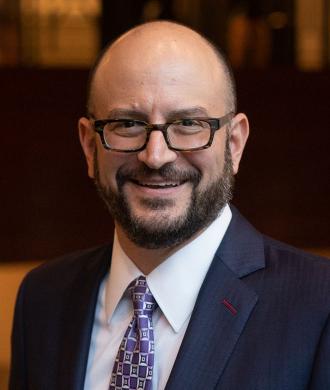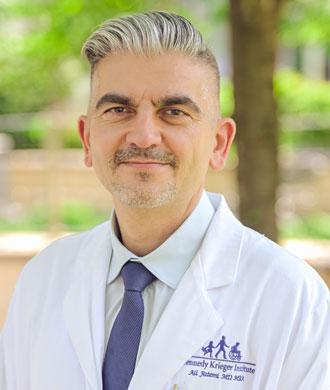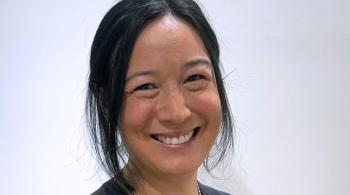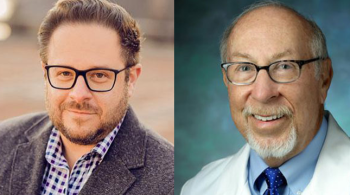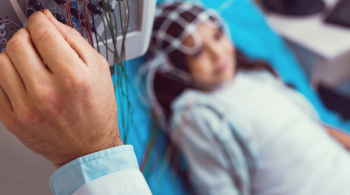In the first episode of "Your Child’s Brain," Dr. Brad Schlaggar and Dr. Ali Fatemi—both pediatric neurologists and neuroscientists—introduce this new series by discussing the many mysteries of the developing brain, exploring neurological diseases, injuries, and overall health, and sharing their passion to better understand how a child’s brain grows, recovers, learns, and heals.
Dr. Brad Schlaggar is President and CEO of Kennedy Krieger Institute. Dr. Ali Fatemi is Kennedy Krieger’s Chief Medical Officer.
Your Child's Brain is produced by Kennedy Krieger Institute, with assistance from WYPR.
Learn More About Our Featured Speakers
Learn More About Our Featured Speakers
View Episode Transcription
Brad Schlaggar (BS): Hello everyone and welcome to the first episode of Your Child's Brain. I'm Dr. Brad Schlaggar. I'm a pediatric neurologist and neuroscientist, and I have the privilege of being the president and CEO of Kennedy Krieger Institute, a truly unique non-profit health care organization focused on improving the lives of children, adolescent, adults with diseases and disorders of the nervous system through clinical care, research, education, advocacy, and training. We're primarily located in Baltimore, but serve the entire state of Maryland and see patients from every state in the U. S. And dozens of other countries. We're really excited to bring you this new podcast series, Your Child's Brain, where we'll welcome experts as well as patients, students and families to discuss topics related to how children grow, how they learn, how they recover from injury and illness, and how they adapt. We're going to focus on a lot of science that informs topics that span common diagnoses like autism and ADHD, and brain and spinal cord injuries, but also rare conditions like Rett syndrome and Sturge-Weber. We'll cover the neuroscience of learning and the brain basis of emotions, behavior, movement, and thinking. But ultimately, we want these podcasts to become a conversation between our listeners and those who work with children and families each day with the goal of expanding possibilities for children everywhere. I'm pleased to be joined by Dr. Ali Fatemi for this first episode. Dr Fatemi is a pediatric neurologist, a renowned neuroscientist who focuses on the neuroscience of rare genetic diseases involving the nervous system. He is also Kennedy Krieger's Chief Medical Officer. Welcome Dr. Fatemi, and you know what, I'm going to call you Ali. To start off this entire series, perhaps we should just give some background about the origins of the idea for the podcast Your Child's Brain. Also, share why each of us pursued the field of child neurology and Brain Sciences for our chosen professions.
Ali Fatemi (AF): Thank you, Brad. Well, I may call you Brad. Let's get started by thinking about how you yourself got down this path. What was it that interested you about the pediatric brain and the pediatric neurosciences and neurology and what is keeping you excited about this type of work today?
BS: Well, I would say that I fell in love with the brain as a high school student. That might sound odd, but it's true. But it was in college that I realized that there was really interesting to study how the developing brain, how it develops typically, but also how it responds to injury. The idea of plasticity of the nervous system. Plasticity means the ability to change to be plastic. It was that, plus my strong interest in being a physician that culminated in focusing on studying the nervous system and being a physician who takes care of children who have developing nervous system problems. There's so much compelling work to be done to improve the lives of children who have disorders of the nervous system. I fundamentally believe that the nervous system is the most important system. Because it's what makes us who we are, all of our lived experiences really come through the nervous system. Taking care of it for children and giving them the best possible pathway in life. But that's about as compelling as it gets. I'm really excited about the profession, but also about all the work that's been done in neuroscience and science in general that has given us the tools to be much more optimistic about our ability to improve children's lives going forward. How about you? Why did you get into this work and what keeps you interested and passionate about it?
AF: I think It's actually relatively similar. I remember actually the day when I was visiting a bookstore, I was visiting a friend at UCLA and right after graduating from high school, before starting medical school. I saw this book on neuroscience and I bought it so I can read it on my flight back. Until then, my plan was to become an engineer and build rocket ships and travel to Mars. I came from a family of engineers. There was no physician in that family and still there isn't. But I saw that book and I read that book and as a high-school graduate fell in love with the brain and realized again, that, like you said that to me, it's the final frontier to understand what's going on between our two ears inside our skull. Because that is the most complex organ, the most complex machine that we know of. Understanding how the brain develops made me move towards understanding diseases that affect children's brain development. That over the years has become more trying to understand what's going on in all these different diseases in children. It has led me to work with patients from around the world, many of whom have diseases that are super rare, that only affect maybe a handful of individuals. But it's very rewarding because again, like you said, there's nothing more compelling than try to improve the lives and the function of individuals, especially if they're children. As we've been talking about the nervous system, it's so complicated. We perhaps take for granted all the complexity that goes into just the development of a child, learning how to walk and talk and all that comes with it. We'll talk over the course of these conversations about what's considered typical and atypical. I mean, there's a lot of variability in what goes into what's considered typical development. Therefore, it's important to know where you cross the threshold and what might be a cause for concern that leads to a recommendation for evaluation or intervention for example. We know that so many parents, we're parents too. We went through this. We worry that we're going to miss something important that can be subtle. We know that this is a really important topic that's on the minds of the parents, grandparents, anybody who's interested in the best outcomes for the developing child. Very much agree. I very much remember those days when my own children, infants and every day I was looking at are they going to do this? Are they going to do that? You're very anxious. I can't imagine how it would be for people who don't know what the normal processes here. One of the questions that is going in my mind is, we are talking about your child's brain development. But the truth is that the children grow up and become adults. We'll also talk a little bit about what will happen when some of these individuals become adults, correct?
BS: Absolutely. Really, I like to think of what we do as lifespan neurology. We call ourselves child neurologists. But really think about lifespan because these disorders and conditions that start out in development do tend to last across the lifespan. There's a real need to understand how best to serve individuals as they transition into adulthood. Then really for the rest of their lives, we see it across the whole arc of a lifespan. At Kennedy Krieger, we see lots of adults. About 20 percent of our patients and students are 18 years or older. I know in your clinics you see people well into their 70s and 80s and perhaps later in life, there is increasing recognition of the need to understand more deeply how not just development, but also maturation and aging, interact with disorders of the developing nervous system. That's a really important focus for study because we need to understand how best to serve people, but also how to best build systems of care in order to make that happen. Here's a good example of where the science is important for guiding how we take on the challenge of systems of care for people across their lifespan.
AF: I could talk about just this one sentence for hours, but let's talk about how we're going to carve up all these topics for our audience.
BS: Well, we're going to have a schedule. It'll be available on the website. The general areas that we're going to address are plenty. As we've been discussing, we'll talk about early childhood, what to look for in your child or grandchild. How to support healthy growth and what to do if you suspect or concern your baby or toddler has something that indicates they might have a condition, but not just early childhood toddlers through preteen years, teens to early adult. We're going to focus also on how different kinds of injuries and insults to the developing brain occur and injuries that can occur, not just the brain, but also spinal cord and the rehabilitation of the brain and spinal cord. I just got to take a moment and say, we've been talking about the brain, but really broadly, we're talking about the entire nervous system; brain, spinal cord, nerve, and muscle. This complex nervous system has so many different ways that it can be affected by disease and injury. For example, we're in the COVID environment, and we know that post-COVID-19, there are consequences for a child who's been affected directly by COVID-19. What does that look like and why? We're also going to dive into myths and facts. Really interested in how children learn at different stages of development and what parents need to know and what educators needs to know about the neuroscience of learning. We'll talk about typical movement and movement disorders, how to spot them and how to intervene. We'll talk about common conditions like autism spectrum and related disorders, ADHD and other common manifestations of atypical brain development. We're going to get to behavioral challenges. They can show up in lots of different ways around eating, sleeping, mood, depression, anxiety, the consequences of being bullied, those sorts of topics and when to seek help. We're going to look at how the world around us can impact a child's brain through trauma or witness of trauma, post-traumatic stress disorder, and how to minimize the impact or reverse the long-term effects of childhood adversity. Pretty significant roster of topics, don't you think?
AF: That's a pretty big lineup. How many years do you think it's going to take us to cover all that?
BS: I'm not sure, but I think if we were best to approach it one bite at a time. But maybe we start with you, the two of us discussing what we know now about the child's nervous system, how it develops, and that maybe we didn't know even 20 or maybe 10 years ago, what advances have been happening in recent years that are driving the field forward?
AF: That's I think a very good point. In my opinion, there has been a dramatic development in the last couple of decades on multiple fronts in the neurosciences. On one front, it's really exciting that we now have non-invasive ways to see how the brain is functioning when we do things using what we call functional MRIs. I know you're a great expert in that area that really has allowed us to gain insight into understanding networks that are developing as we become a person and develop our personalities, and how those things can go wrong. At the same time, on the other end of neuroscience, when we look highly at the molecular level inside our genes, what has happened is really a revolution in the last 10-20 years. 20 years ago, we sequenced the first human genome, the first three billion DNA letters that were sequenced. Now we can do that at a very easy method and get this results in any individual we want. That has allowed us to really understand a lot more about disease processes and also how things function. Because we see that if this particular gene is affected, this is what happens and that results in us gaining more insight about processes.
BS: Yeah, I am with you. I think the ability to get to precision medicine and by that I mean individualized medicine, where the treatment approach is specifically designed for the patient right in front of you. As opposed to general approaches that may or may not be beneficial for that patient right in front of you. All the advances, not just in neuroscience but in computational biology and analytics, making it possible to bring forward all kinds of data from your genome, from your brain organization, and all kinds of other information to use that to make specific recommendations for treating individual patients. I think that's just the most exciting direction that we're going. You talked about functional MRI. As you said, that's an area of great interest for me. But in general, certain non-invasive methods of understanding how an individual's brain is organized. Then using those non-invasive methods, meaning not having to have a surgery or an implant, but to use methods that we can use to target brain organization and shift it to improve function. I think that's a really fascinating direction for us. Again, it's the consequences, all kinds of research and investigation over the last couple of decades making that possible. Then I think the opportunities that exist for us in understanding education, the neuroscience of education, the educational environment is really just a setting for cognitive development to be advanced. I think you feel the same way. There's a seamlessness between thinking about optimizing functional outcomes for patients and optimizing cognitive and developmental outcomes in the school setting. They're all another piece, and the neuroscience that advances that we've had are also yielding and making a future that is precision education, individualized education, I think is extremely exciting. It's one of the reasons that I love being at Kennedy Krieger Institute because we are both a health care organization, but also we provide school opportunities for students that have educational needs. There's all kinds of excitement that comes as a consequence of deeper understanding of the developing nervous system and all the tools that have come converging from lots of different directions [MUSIC] We hope we've piqued your interest in Your Child's Brain. We welcome your comments, questions, and suggested topics, and are looking forward to continuing these discussions. For Dr. Ali Fatemi and Kennedy Krieger Institute, I'm Dr. Brad Schlaggar and this has been Your Child's Brain. Your Child's Brain is produced by Kennedy Krieger Institute in partnership with WYPR and producer Mark Gunnery. You can find Your Child's Brain on any podcast app or WYPR.org on the second Thursday of every month. Please join us next time as we examine the mysteries your child's brain [MUSIC]

